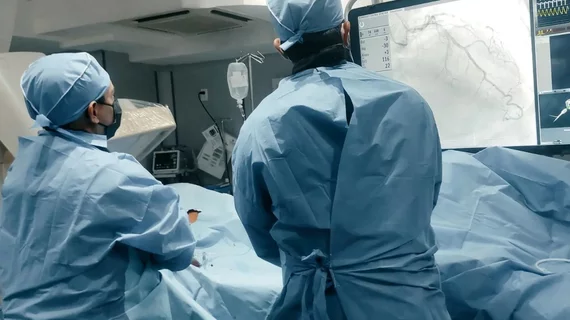Interventional cardiologists can safely perform PCI without on-site surgical backup
Percutaneous coronary intervention (PCI) is just as safe to perform at facilities without on-site surgical backup as it is at facilities with on-site surgical backup, according to a new expert consensus statement from the Society for Cardiovascular Angiography and Interventions (SCAI).
Performing PCI at facilities without surgery on site (SOS) was once believed to be associated with more risks for the patient, but interventional cardiologists have been performing the procedure for decades now, and outcomes appear to be improving more and more as time goes on.
The SCAI previously evaluated this topic in 2007 and 2014. When the group issued its 2014 statement, it was purposefully conservative with its recommendations due to the relatively limited amount of available data on PCI at facilities with no SOS. This new statement, however, is crystal clear: PCI at facilities with no SOS provided safe procedures and can provide substantial value.
“Since we released the last consensus statement in 2014, same-day discharge after elective PCI has increased to 28.6% of all PCIs and 39.7% of radial PCIs in the United States,” Cindy L. Grines, MD, chair of the statement’s writing group, SCAI past president and interventional cardiologist with the Northside Hospital Cardiovascular Institute, said in a prepared statement. “Elective PCI in no-SOS settings have increased in volume and complexity. Concurrently, there have been operators performing PCI in office-based laboratories (OBLs) and ambulatory surgery centers (ASCs) with positive outcomes. Thanks to improvement in PCI safety and several global studies in recent years, we now know that PCI at ASCs may improve access, patient satisfaction and reduce costs.”
The document, published in full in the Journal of the Society for Cardiovascular Angiography and Interventions and JACC: Cardiovascular Interventions, has been endorsed by the American College of Cardiology, American Heart Association, British Cardiovascular Intervention Society, Canadian Association of Interventional Cardiologists and Outpatient Endovascular and Interventional Society.
Read the full expert consensus statement here.
Want to learn more? Tune in to our related webinar, "No Surgical Backup? No Problem. Intravascular Lithotripsy in Non-Surgical Facilities," on March 1. Find more details here.

